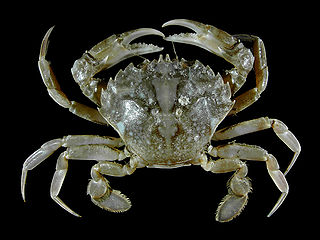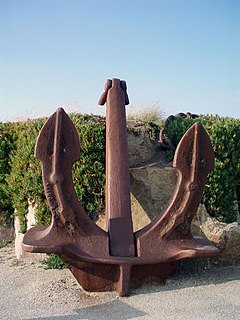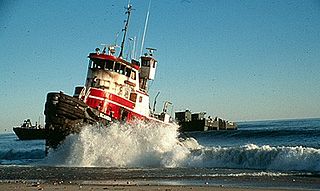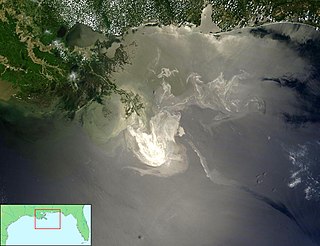The 1997 Guanabara Bay oil spill was one of three major oil spills in Guanabara Bay in Brazil. It leaked from the oil refinery at Duque de Caxias (REDUC) operated by Petrobras.

An oil spill is the release of a liquid petroleum hydrocarbon into the environment, especially the marine ecosystem, due to human activity, and is a form of pollution. The term is usually given to marine oil spills, where oil is released into the ocean or coastal waters, but spills may also occur on land. Oil spills may be due to releases of crude oil from tankers, offshore platforms, drilling rigs and wells, as well as spills of refined petroleum products and their by-products, heavier fuels used by large ships such as bunker fuel, or the spill of any oily refuse or waste oil.

Guanabara Bay is an oceanic bay located in Southeast Brazil in the state of Rio de Janeiro. On its western shore lies the city of Rio de Janeiro and Duque de Caxias, and on its eastern shore the cities of Niterói and São Gonçalo. Four other municipalities surround the bay's shores. Guanabara Bay is the second largest bay in area in Brazil, at 412 square kilometres (159 sq mi), with a perimeter of 143 kilometres (89 mi).

Brazil, officially the Federative Republic of Brazil, is the largest country in both South America and Latin America. At 8.5 million square kilometers and with over 208 million people, Brazil is the world's fifth-largest country by area and the fifth most populous. Brazil borders every South American country except Chile and Ecuador. Its capital is Brasília, and its most populated city is São Paulo. The federation is composed of the union of the 26 states, the Federal District, and the 5,570 municipalities. It is the largest country to have Portuguese as an official language and the only one in the Americas; it is also one of the most multicultural and ethnically diverse nations, due to over a century of mass immigration from around the world.
Contents
Petrobras estimated that a leaking pipeline released 600,000 liters (160,000 US gal) of oil into the bay, but according to Sindipetro - the petroleum industry's union - it was 2,000,000 liters (530,000 US gal) of oil that had been spilled. [1] The incident also had a large damaging effect on marine life in the ocean; as well as, other existing areas surrounding the bay area. Many fish suffered tragic deaths as they were washed up on the shore dead or covered in oil. In addition, the fishing industry suffered a great downfall and local fishermen were unable to work or fish in the bay.
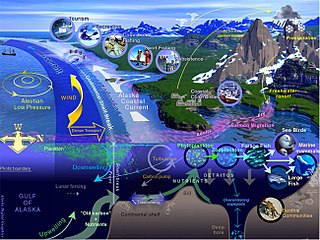
Marine life, or sea life or ocean life, is the plants, animals and other organisms that live in the salt water of the sea or ocean, or the brackish water of coastal estuaries. At a fundamental level, marine life affects the nature of the planet. Marine organisms produce oxygen. Shorelines are in part shaped and protected by marine life, and some marine organisms even help create new land.

An ocean is a body of water that composes much of a planet's hydrosphere. On Earth, an ocean is one of the major conventional divisions of the World Ocean. These are, in descending order by area, the Pacific, Atlantic, Indian, Southern (Antarctic), and Arctic Oceans. The word "ocean" is often used interchangeably with "sea" in American English. Strictly speaking, a sea is a body of water partly or fully enclosed by land, though "the sea" refers also to the oceans.

The fishing industry includes any industry or activity concerned with taking, culturing, processing, preserving, storing, transporting, marketing or selling fish or fish products. It is defined by the Food and Agriculture Organization as including recreational, subsistence and commercial fishing, and the harvesting, processing, and marketing sectors. The commercial activity is aimed at the delivery of fish and other seafood products for human consumption or as input factors in other industrial processes. Directly or indirectly, the livelihood of over 500 million people in developing countries depends on fisheries and aquaculture.

